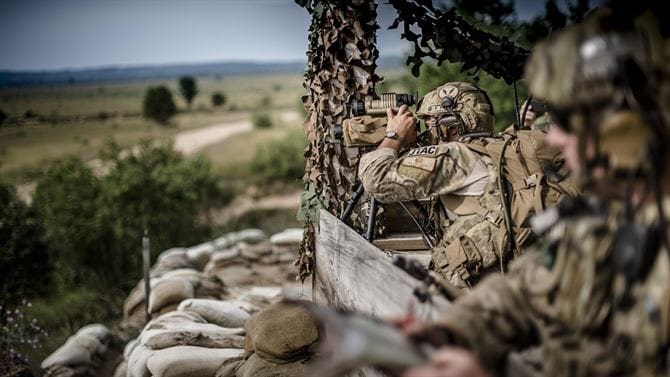
Senior Airman Paul Cauge, a 274th Air Support Operations Squadron joint terminal attack controller, uses a laser rangefinder designator for a close air support training mission July 29, 2015, at Grayling Air Gunnery Range in Grayling, Mich., during Northern Strike 2015. The annual exercise involved hundreds of military personnel from 20 states, as well as Canada, Latvia, Poland and Australia. (U.S. Air National Guard photo/Master Sgt. Scott Thompson)
The new incentive pay, which will replace hazardous duty incentive pays, are designed to incentivize Airmen to maintain qualifications for critical and essential skills such as jump, dive and demolition. Currently, Battlefield Airmen only receive these incentives when performing their duties, and limit monthly payments when an Airman is unable to perform these skills due to medical restrictions or career broadening opportunities.
“Our nation requires that we send our Battlefield Airmen into harm’s way and calls for them to operate in some of the most dangerous places on the planet,” said Air Force Chief of Staff Gen. David L. Goldfein. “Their training is extensive and grueling, and they maintain the skills that our Air Force and joint force rely on.”
“The current pay structure was causing unnecessary financial burdens for these warriors when their incentive pay would stop during temporary medical restrictions or a career broadening assignment,” he said. “We now have the authority to pay these warriors based on their qualifications, and this is the right way to take care of Airmen from whom we ask so much.”
The change removes the financial disincentive currently associated with Battlefield Airmen seeking medical care or broadening assignments as instructors or members of headquarters staff under the hazardous duty pay program, for example.
This three-year pilot program ensures the new incentive pay will be equal to existing incentive pays battlefield Airmen already receive in the following Air Force specialty codes: combat control, pararescue, tactical air control party, special operations weather, combat rescue officer, special tactics officer and air liaison officer.
Implementation of battlefield Airmen skill incentive pay is set for this fall. For more information, Airmen are encouraged to contact their local support squadron office.
The Battlefield Airmen Skill Incentive Pay pilot program will replace other pays and offer up to $615 per momth.


Gee, maybe the other services will jump on this idea. Maybe, even the Navy could furnish sea pay to sailors on shore duty to keep them from avoiding a financial hardship. Or, the Marines could pay pilots flight pay if they are NPQ from flying. I suspect the Army could pay former airborne qualified enlisted Soldiers jump pay while they are attending the USMA and earning their commission. I like this idea, even though many taxpayers will not.
The USMC already has jump, dive, and demo pay if you’re in a billet that necessitates that.
The point was to have legal authority to pay these pays when NOT “in a billet that necessitates that.” I can see advantages for the USAF to apply this to a SMALL community (high-skilled, scarce, “Battlefield Airmen” not currently performing the duties of…) who can be expected to rotate back into “performing the duties of” throughout their careers.
However, before every soldier with a set of jump wings starts dreaming of an extra $150 per month, this would probably NOT be a good idea for the huge population of Army “GP” airborne qualified personnel. The most obvious 2nd order effect would be a financially-driven curtailment of jump school slots.
A 3rd order effect would be another finance-driven pressure to reduce airborne unit manning levels (saw this 20 years ago, when for a while we went into a dangerous window of having NO standing, ready-to-go, airborne Forward Surgical Teams in 18ABC. We had an ad hoc contingency plan, but believe me, some fingers were kept crossed then!).
I understand the intent, I think, but this is horribly executed. Financial burdens? How does the rest of the force manage without ever having those incentive pays? This stinks of some action officer on a staff somewhere who went to jump school ten years ago and wants more money, but, more likely look to see if flight pay is wrapped up in there somewhere. Friggin’ zipper suited sun gods.
At some point everyone does a staff tour, attends PME or otherwise is pulled from their AFSC’s duties for whatever reason. If you’re not doing the job, then guess what, the pay stops, it’s always been that way for a reason. There are already processes in place for deployments and such preventing certain proficiency actions from occurring to a schedule.
They are now making it more like career flight pay.
USASOC has been kicking this concept around for at least 10 years, but has never had a specific proposal that made it out of staffing. I am interested to see if the USAF is able to bring this to execution and deal with the follow-on effects.
It’s a three year test. I am interested to see how it goes.